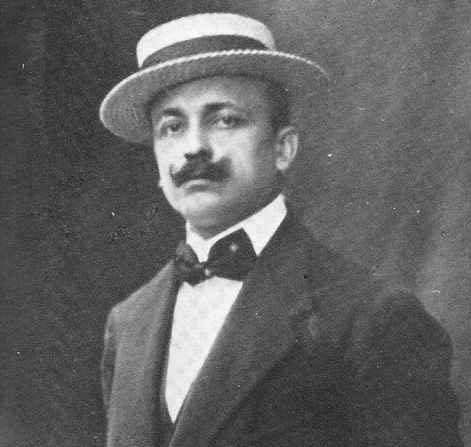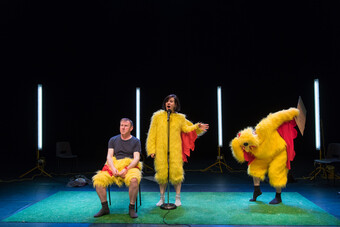Bad Influences
I am of the opinion it is as important to cultivate your bad influences as your good ones. After all, theater is, at its core, about misbehavior. What would Medea be if her story ended with her tucking her children into bed and wishing them a good night’s sleep? Would we still be performing Oedipus Rex nowadays if the title character had a happy relationship with his father and nary a wayward glance at his mother? We can learn a lot from misbehavior, and so it is worth looking to our great misbehavors.
Art benefits from the angry outsider, the sneering punk, and the puzzling misfit, because art benefits from being challenged. Theater can be a remarkably conservative form, especially for something that started, in part, as a pack of drunken Italian women throwing wild, illegal parties in the woods; we seem to reflexively bounce back to rather traditional approaches to telling narratives, and creating characters, and expressing dialogue. We need our rebels as much as any art form, perhaps more. I keep my eyes open for entertaining misbehavors. And not merely because I like when artists, and their art, get people’s dander up. These artists genuinely challenge me to think about playwriting, and the role of the playwright, differently. They expand my own storytelling language, and explode my sense of how I might participate in creating theater—or, for that matter, just making a scene.
Filippo Tommaso Marinetti: There is a lot to dislike about Marinetti and the movement he spawned, Futurism. It had a lot in common with the current Internet phenomenon of trolling, in which you deliberately say incendiary things for the perverse pleasure of watching somebody get frothingly angry about it. And the Futurists demonstrated that troubling ideas can have consequences in the real world— the Futurists were unabashedly nationalistic, and celebrated automation and violence, all of which Italian fascists found enormously appealing. Marinetti returned the affection: He worked tirelessly to integrate himself into the Italian Fascist Party. That being said, there is an art to trolling, and Marinetti embraced it.
Never before, and rarely since, has there been an artist so deliberately irritating to his audience. Marinetti wrote an essay championing getting booed, saying any other response indicated art that was “mediocre, dull, regurgitated or too well digested.” He advocated booking two shows into an auditorium at the same time, and putting glue on a seat, and anything else that might prompt heckling or rioting. His blind, absolute decision to reject everything in the past, which, in his hands, represented an embrace of violence and cruelty, nonetheless set a sort of template for the relentlessly experimental art of the 20th century, which has often sought to destroy whatever art preceded it. And while I think he was a bit simplistic in his approach to annoying an audience—trust me, they’re easy to annoy—I do think he was on to something when he suggested that art that is celebrated often gets its laurels for being unchallenging.
It’s worth remembering that sometimes a standing ovation means you have failed as an artist. I have a scene in one of my plays, Basement Porn Party, in which, right at the climax, a stage assistant rushes out and drives the entire audience out of the performing area until the climax has played out. All they get for a climax is an apology from one of the performers, who looks badly chagrined. I think of this as a “Marinetti moment,” a moment that runs the real risk of simply irritating the audience.
Joe Orton: Orton’s stinging, pitch-black satires are great fun, but I am most influenced by his chronic pranking. Notoriously, he and Kenneth Halliwell, his partner and eventual murderer, used to take books out of the local library and replace their covers with crass, outrageous covers of their own creation (for example, a book of plays by Emlyn Williams suddenly bore this text on its dust jacket, as though titles of plays: Up the Front, Knickers Must Fall, Up the Back, Fucked by Monty—these are great titles, and I might steal Knickers Must Fall one of these days). This led to both being arrested and imprisoned, an outrageous punishment that fueled Orton’s resentment against authority and its abuses, turning him from a failed novelist into a playwrighting sensation. Even more entertainingly, Orton created a fictional alter ego, the dense and conservative Edna Welthorpe. Orton would frequently write letters to the press as Edna, complaining about his own plays. “I was plunged into the dumps for weeks after seeing Entertaining Mr. Sloane," she once complained. Plays always benefit from a whiff of myopic disapproval, and Orton knew enough to drum it up himself.
I’ve never had the nerve to write pseudonymous letters to the press complaining about my own plays. However, during the production of my first show I got word that a state senator had complained about the production and called for a boycott. He had done so on a small, mostly ignored cable access television show, but I immediately called the press. “If you’re going to do a story about this,” I told them, “I would like a chance to respond.” Of course, they hadn’t actually been planning to do a story, and hadn’t even heard about his complaint. But the next day, in the metro section, there was a story about the controversy. The play did very well, and I have always wanted to write a letter to the senator to thank him for helping my play.

We need our rebels as much as any art form, perhaps more... They expand my own storytelling language, and explode my sense of how I might participate in creating theater—or, for that matter, just making a scene.
Valerie Solanas: She’s probably best remembered for two things: shooting Andy Warhol in 1968, and writing the SCUM Manifesto, the official text of an organization that had only one member, herself, and stood for The Society for Cutting Up Men. But Solanas was also a playwright, and, in fact, shot Warhol because he had lost what seems to have been her only script. And what a script! Titled Up Your Ass, the dialogue was so outre, even by Warhol’s standards, that he was convinced it was some sort of police trap to get him arrested for pornography. The script vanished for years, but was discovered after Warhol’s death, and premiered in 2000 in San Francisco. The Village Voice immediately declared it “a hilarious, dirty-minded send-up of heterosexuality on the eve of the sexual revolution and the sex and gender wars to come.”
And what dialogue! A character named Bongi Perez declares herself “so female, I'm subversive”; she later says something that sounds like a rehearsal for the SCUM Manifesto: “Men're totally unreasonable; they can't see why they should be eliminated.” To this day I am baffled why this play didn’t become a sensation, even with its late premiere. More than anything, I think I’m influenced by Solanas’s title. I’m currently working on two scripts, Screw Me in the Bathroom and Fucked Up Rock Stars Trash a Hotel Room, and I honestly think without Solanas, I probably would have given both the sort of poetic, anonymous title that playwrights favor, and that wouldn’t have done at all. I like titles to be a little scary.
Cameron Jamie: Properly, Jamie is a part of the world of fine arts. But I’ve always felt that the world of theater would benefit from the experimental lunacy that always seems to be in vogue in contemporary art. Jamie, as an example, once made a video of himself dressed as a masked wrestler fighting with a Michael Jackson impersonator in his apartment. Perform it live, and I’ll happily call it theater. Heck, I’d line up outside his door, like people do for Star Wars movies. My favorite Jamie creation is something called The Goat Project, which may or may not be ongoing; actually, there’s scant evidence it ever really happened. But if you take his word for it, Jamie will infrequently dress as a vampire and wander his childhood suburban neighborhood of Northridge, California, doing things like getting drinks and going shopping. Jamie brings a single witness along with him, who then describes the evening to a commercial illustrator, who illustrates the story they have just heard—the only documentation it happened.
Is it theater? Well, I’d argue that for the single witness it is—he or she experiences a recurring live performance. It even has a script, although one that is pared down to a single directive: “Go to a bar”; “Ride a horse down a street”; “Go shopping while limping like a hunchback.” When most performances struggle to find their audience, there’s something heartening that Jamie limits his audience to one person. Maybe this is the wave of theater in the future—we throw a velvet rope around performances and only let in a few, carefully selected audience members. It worked for Studio 54, it can work for the legitimate stage! Most of my newer scripts are meant for small audiences. Rock Stars, for instance, will take place in an actual hotel room that will actually get trashed over the course of the play, and the audience will be there in the role of groupies. Obviously, this means there won’t be more than four or five at them at any show. Is this economically viable? I don’t care. I don’t make any money off my plays anyway.
Vito Acconci: Here is another example of someone who is primarily associated with the fine arts, but I draw specifically theatrical lessons from him, specifically, from three works. There was 1971’s Telling Secrets, in which the artist sat in a shed and, if anyone approached him, whispered secrets to them that might, as he put it, “have been totally detrimental to me if publicly revealed.” My God, what theater! Edward Albee might have exposed his character’s secrets, but he never sat onstage and revealed his own! And what a way to engage the audience! Acconci went even farther with Seedbed, from the same year, in which the artist sat under a bridge he had built in a gallery, and then talked to people who crossed the bridge, and masturbated. This wasn’t just trolling, this was an artist as a literal troll, demanding that you take part in his sexual fantasies in payment for crossing his bridge. But, as much as he engaged his audience in these works, and involved them, to some extent—as coconspirator and as sex object—the audience was still the audience.
Not so in 1974’s Command Performance, in which Acconci set up a chair, an empty space, a video camera, and a soundtrack. There could be no performance unless an audience member decided to step in front of the camera and start performing. I wonder if any did? Nowadays, it would be hard to imagine people wouldn’t—in fact, one expects that hundreds of teenagers would mistake it for an American Idol audition and line up around the block. Acconci seemed to anticipate a world of desperate exhibitionists, in which people only require a space and a few cues and they’ll go ahead and make their own performance. And I sort of think we are living in that world. If I have a complaint about reality television, it’s not that it gives opportunity to exhibitionists, it’s that it gives them such an awful opportunity. Generally, the participants are there to be made fun of. I’d love to see a sort of theater that invites people to be exhibitionists, but without the mockery.
I suppose there is the risk that Acconci might be somewhere, watching and masturbating. But let him! He should be able to enjoy the theater he helped create. He’s a big influence on Screw Me in the Bathroom, which is a play that is intended to have an audience who weren’t aware that they were going to be an audience for a play. The whole of it takes place in an actual bathroom, during an event (preferably without permission), and consists of two people in two stalls hitting on each other with absurdly graphic language. The show lasts just as long as the accidental audience member is in the bathroom, and ends when they leave, presumably by fleeing.










Comments
The article is just the start of the conversation—we want to know what you think about this subject, too! HowlRound is a space for knowledge-sharing, and we welcome spirited, thoughtful, and on-topic dialogue. Find our full comments policy here
Thank you for this. I think you and me are twinsies.
Max, I loved this and love the idea of work for audiences who don't know that they are going to be audiences. Street-as-theatre-Street theatre; but in a bathroom. How much more exciting would life become if one in every 1000 people had stumbled upon Screw Me in a Bathroom? Seriously!